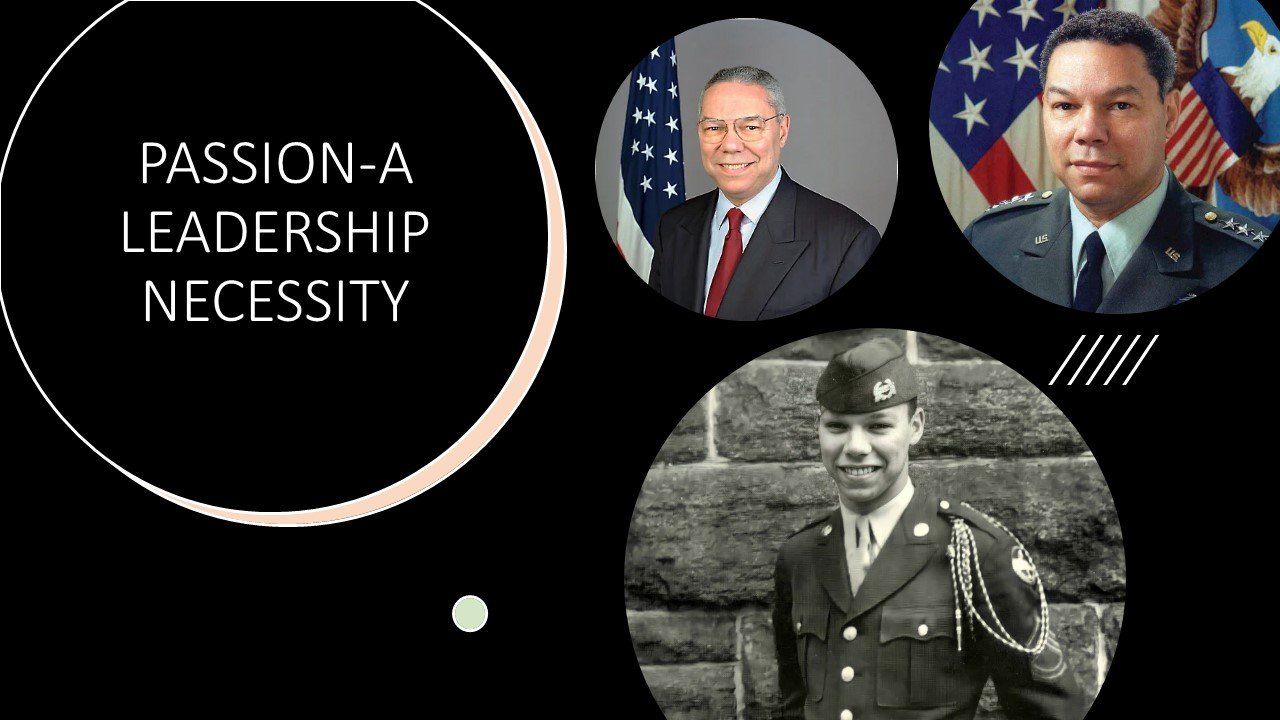PASSION- A LEADERSHIP NECESSITY
This is a subtitle for your new post

“Great leaders inspire a great sense of hope, possibility, and confidence even under the most trying circumstances.”
-Oren Harari
Former U.S. Army General and Secretary of State, Colin Powell, was, and still is, one of my heroes. I have the deepest respect and admiration for the dedication, passion, and enthusiasm he exuded throughout his life, beginning with his time as an ROTC cadet in college and maintaining this passion throughout his career. This passion never waned. His intellect and warrior ethos still inspire me, and so many others to this day.
Passion exuded by a leader provides the catalyst for perpetuating exceptional attitudes and outlooks by all those in the organization. If you want your organization and people to succeed, it must be genuine and constant. This is the challenge for a leader, as often, circumstances and situations may drain a leader. This is natural; however, it’s times such as these when passion is even more important. During challenging times, followers will automatically look towards their leader for guidance and more importantly, inspiration. Winston Churchill, former prime minister of England who led Great Britain through the most challenging times of WW II (1940-1945), stated, “Success is measured through our ability to maintain enthusiasm between failures” (Harari, 2002, p. 227).
Enjoying what one does certainly allows a leader to better typify the passion desired in others. Moreover, a leader has an inherent obligation to reach down and display boundless enthusiasm for what they do. English novelist and short story writer, E.M. Forester most succinctly said regarding this that, "One person with passion is better than forty people merely interested” (Forester, 2010). This statement is even more applicable to leaders.
Leaders without passion pose a huge threat to any organization. A leader’s attitudes and actions affect the followers, and for better or worse, the organization reflects the leader. A passionless leader results in passionless organizations that aspire to nothing. American philosopher and essayist, Ralph Waldo Emerson believed that, "Enthusiasm is one of the most powerful engines of success. When you do a thing, do it with all your might. Put your whole soul into it. Stamp it with your own personality. Be active, be energetic and faithful, and you will accomplish your object. Nothing great was ever achieved without enthusiasm” (Emerson, 2010).
When leaders come across junior leaders who are failing at meeting the needs of the organization and its people then it is imperative that you either work to help them, as previously stated, “be good or be gone”, Colin Powell comments the importance of this very issue by saying, “…underachievers …be reviewed, retooled, or removed” (Harari, 2002, p. 25). Leaders must instill passion in the masses and remove leaders who fail to create the necessary desire in others. This aspect of passion, according to Colin Powell means that leaders “Generate the interest of ‘the led’, so that- they contribute to the work of the organization and want to be part of what’s going on” (Harari, 2002, p. 70). This concerted effort must be displayed regardless of the task or assignment the leader is performing or charged to supervise. Powell (2007) says again with some foundation in this statement from Aristotle, “If you are going to achieve excellence in big things, you develop the habit in little matters. Excellence is not an exception, it is a prevailing attitude “(Harari, 2002, p. 198).
It’s also important to note that when a leader finds him or herself performing a role that they may feel is not worthy of their experience or abilities, to perform with passion even more so. In the Army a Soldier will go from serving as a leader to serving a vital role in the staff. Many times, leaders feel that such roles are beneath them or that because they are not leading Soldiers, they are not really doing what is important. Nothing could be further from the truth. The reality is, that the staff serves the line and without dedicated and competent staff that have worked and served in the line, poor plans and products can result. Moreover, Soldiers, or others who must serve in staff roles must keep several things in mind before allowing themselves to perform below the level they have always performed or externalizing poor attitudes while serving in these capacities. Remember that it is, as all other roles are a vital role and one that is typically served in for a finite period. The natural progression of ascension requires fulfilling these vital roles to allow a leader, Soldier, or future leader preparing for the next level the opportunity to serve the entire organization. This allows the leader the chance to see how these staff functions work to plan, prepare, and execute the larger organization’s mission. Eventually, the leader will return to the leadership role with a much better understanding of the “big picture” and will be better able to explain to the led the importance and requirements that the higher organization expects.
Lastly, when the leader does return to a leadership role, members of his or her organization will ultimately be tasked to serve in these roles. If you as a staff member had a poor attitude, performed poorly at the staff role because you did not like it or felt that “because you weren’t leading it wasn’t worth your time”, how will you be able to say with conviction and passion that the person who has now been selected to perform a staff role, should do and perform their best if you had not done so when you had served there?
Bil Holton in his book, “The Leadership Lessons of Ulysses S. Grant” says, “There is no insignificant work-only insignificant effort.” (Holton, Leadership Lessons of Ulysses S. Grant, 1995, p. 108).
Example and passion in all things you do will serve you well not solely for the results achieved but the moral foundation that you establish which will allow you to give sound and truthful counsel to those who will also potentially serve these in roles.
It is sometimes challenging when leaders are tremendously passionate about what they do. This is because the nature of any organization is that many will not share your passion or enthusiasm and see your desire as “kissing up”, or as “brown nosing”. However, if what you do is done out of a visceral desire to excel and help others to excel, then you cannot allow yourself to be hindered by such a thing. Additionally, this passion allows you to hold others to higher standards of conduct and performance. Having said that, leaders must also temper their expectations with some reality. This is not to say that a leader should be overly cynical when thinking that followers will not commit themselves to the same high standards of the leader. If you as a leader are an above average performer and expect always that followers will perform to that level, to your level, and not the level of expectations set forth in doctrine, or written standards, often, you will be disappointed. It is just the reality that a leader must understand. If you as a leader always perform above all established levels of standards and guidance, as your natural passions may carry you to do, you can absolutely expect followers to try to emulate you. If they do not, don’t punish those who fail to emulate your passion.
Every organization both big and small has the exceptional and ordinary. As a leader, it is your job to give them all you have to offer regardless of if they reciprocate. I realize this is challenging. It is a natural tendency for leaders to give the most to those who also give their best. But a leader must temper passion with reality and work to not alienate those who may not have the same desire and commitment. Be passionate but also be patient. Work to spend time with those who will add the most value to the organization. This may seem to contradict what was stated before about giving the most to all members of the organization, but this is not “giving” but rather “investing”, and much like investing in the markets, you invest the most where there is the most to be gained, but you must be diverse in your investing to allow the best possibility and opportunity of a return.
In an organization, the people who are the most passionate about what they do are those that will add the most value to any organization. However, a leader must also, “Consider everyone on his or her merit. Accept talent, commitment, and character wherever you find it. Do your best to look beyond the surface of family background, social status, degrees, and the patina of appearance. Real leaders look hard for real people with virtues” (Briner & Pritchard, 2008, p. 16). You as the leader must seek, find, develop, and invest in your organization.









